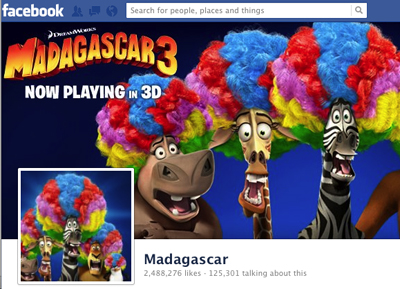An advocacy group wants Merck to back away from a recent Children’s Claritin promotion, and has brought the FTC in as a referee. The issue: a marketing tactic that incorporates the characters from the DreamWorks’s animated Madagascar trilogy.
Merck’s marketing strategy included tapping into its network of mom ambassadors — which consists, in part, of bloggers who have signed up to receive offers and promote products — and giving mommy bloggers a party kit including samples and coupons for the OTC allergy medication, along with popcorn holders, stickers and DVDs of the previous Madagascar movies. Some bloggers posted the details of their parties, thank-yous to Merck, and descriptions touting product benefits. The push also included a Facebook page featuring activities and product shots.
That set watchdog groups snarling. “This campaign is in violation of longstanding FTC precedent to protect children from child-directed marketing of OTC supplements, and by extension, OTC drugs,” the Public Health Advocacy Institute stated in its June 20 letter. The group was referring to a 1977 ruling by the FTC that said it was “unfair” to use Spider Man to promote a vitamin because children can’t decide whether they need vitamins. The FTC also said at the time that children are likely to transfer their trust of a character to a brand, because they cannot distinguish advertising from content.
The interest group’s letter, filed on behalf of five organizations, including Eat Drink Politics and Public Citizen, said that the campaign’s problems go beyond targeting children to include possible product confusion — DreamWorks has also licensed the franchise characters to promote a variety of foods, including candy, fruit snacks and crackers and said the possible mix-up between food and medication “creates a very real danger of product confusion that may lead children to over-consume Merck’s grape-flavored allergy medication.” DreamWorks did not respond to inquiries regarding its licensing policies by press time.
Merck also did not respond to MM&M by press time, but company spokespeople told other news organizations that the manufacturer reaches parents where they gather and that the Claritin promotion was aimed at parents, not children.
Deborah Dick-Rath, president of consulting firm Epic Proportions, told MM&M: “While I agree that we would never want children to over-ingest Claritin or any other drug thinking it is candy, the overall promotion and tie-in is clearly aimed at parents. The Facebook page is targeted at moms and the activities, while kid-oriented, must be mom-directed. Any problems that may arise would not be a result of the Merck promotion, but more from ordinary kid curiosity.”
Dick-Rath also pointed out that this isn’t the first time drug makers have used characters from a children’s movie to promote medications, and noted that Roche used characters from the movie “Happy Feet” for its prescription drug Tamiflu. She said that campaign didn’t kick up a lot of dust and said there are larger issues to tackle.
“The strategic use of a children’s film in each case seems to be appropriate and safe. Maybe we should be more concerned about over-ingesting a lot of those Happy Meals instead,” she said.
Existing marketing guidelines don’t really fit the Claritin paradigm – Claritin is OTC, Tamiful is prescription. Claritin is a medication while vitamins are supplements. But former FDA assistant chief counsel Arnie Friede told MM&M the campaign begs the question “even if it’s not legally prohibited if it is a responsible marketing approach.”
“I do think it is fair question for the OTC drug industry to ask itself whether children’s products should be promoted on their merit or if they should be promoted both on their merit and with tie-ins that have nothing to go with the safety and effectiveness of the drug” he added.
PHAI’s letter did not demand that Merck’s Facebook page be pulled down or the Madagascar-themed packages be pulled and is looking for an impact that goes beyond this one product. Senior staff attorney Cara Wilking told MM&M they want to encourage the FTC to set out clear limits on “how tie-ins can be used with respect to the marketing of OTC drugs and also including, you know, creating special packaging with stickers or other things that appeal to children.”








